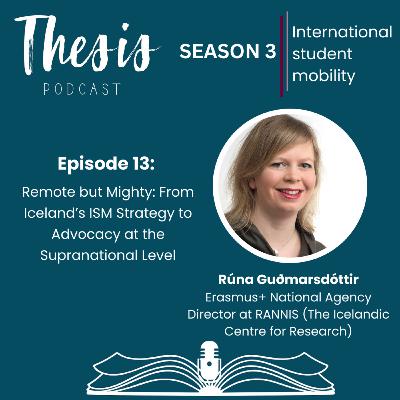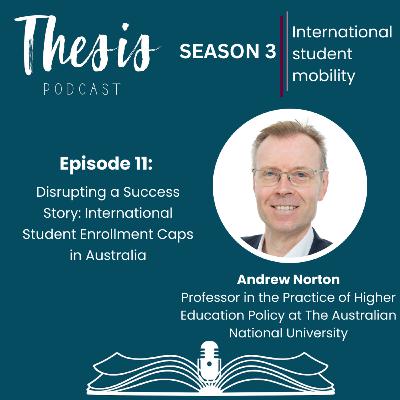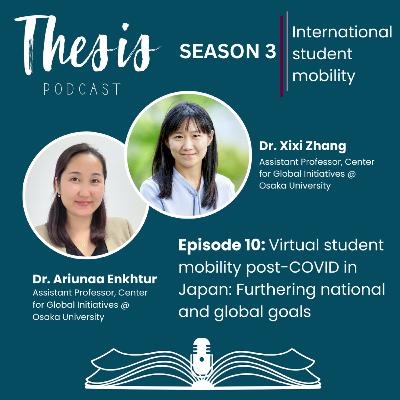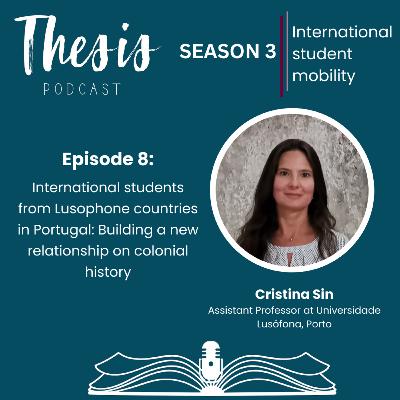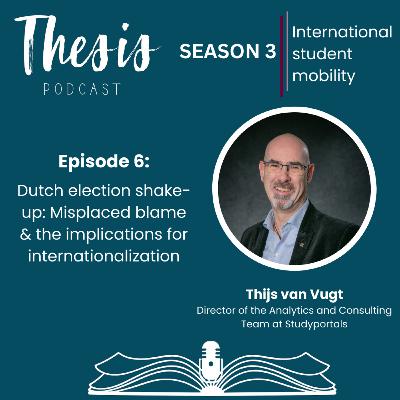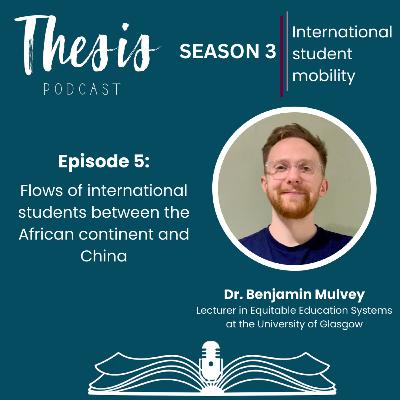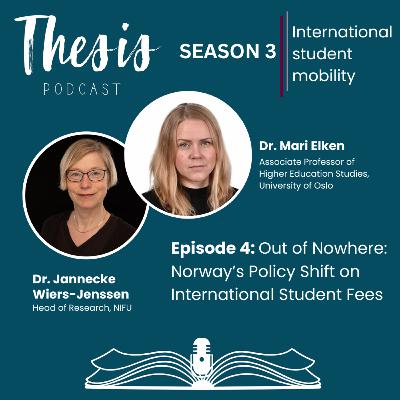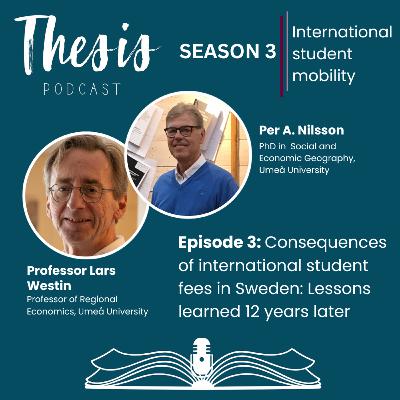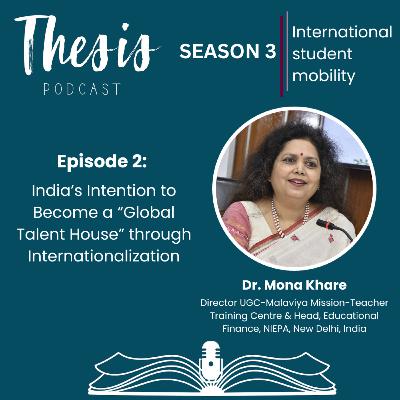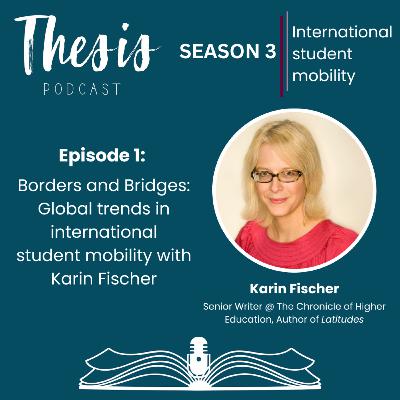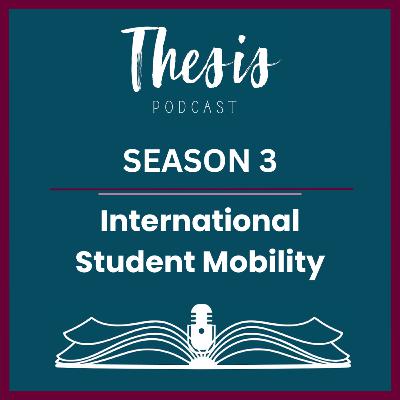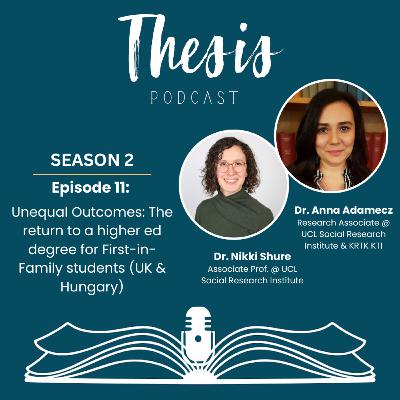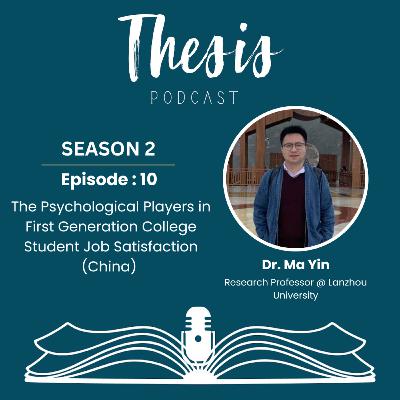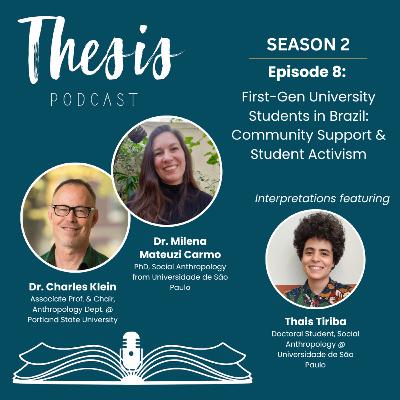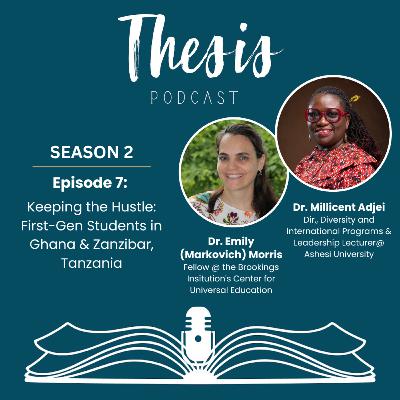Discover THESIS: Trends in Higher Education Systems in International Spheres
THESIS: Trends in Higher Education Systems in International Spheres

THESIS: Trends in Higher Education Systems in International Spheres
Author: THESIS Podcast
Subscribed: 6Played: 42Subscribe
Share
© THESIS Podcast
Description
The THESIS podcast aims to explore higher education across the globe through a range of perspectives, discuss relevant topics in a critical and digestible manner, and contribute to discourse among students, scholars and experts in the higher education field. It is organized and produced by several students in University of Oslo’s Master of Philosophy in Higher Education’s 2021 cohort who come from across the world who have an array of experiences and interests in the Higher Education field.
45 Episodes
Reverse
We are wrapping up our third season on international student mobility today with our guest, Tijmen Weber. Tijmen recently obtained his PhD focused on the movement of international students and how immigration, institutional characteristics, programs, and funding policy influence their migration trajectories. He works at the international business program of HAN University of Applied Sciences in the Netherlands, where he mostly teaches courses in quantitative research and data science and does (applied) research on sustainability for the Research Center International Business at the HAN.
You can view Tijmen's website for his research here: Global Campuses? Mapping the Influence of Location on International Student Mobility
Check out the related sources below:
de Haas, Hein. (2021). A theory of migration: the apsirations-capabilities framework. (open access)
Charles, Maria & Bradley, Karen. (2009). Indulging Our Gendered Selves? Sex Segregation by Field of Study in 44 Countries.
Today we’re talking about Iceland, a small country of almost 400,000 people considered a “remote” location for students studying abroad. We speak with Rúna Gudmarsdottir, Erasmus+ National Agency Director at RANNIS (The Icelandic Centre for Research), about how Iceland both attracts incoming students and works to support students going abroad.
In her role as the Director of the National Agency, Rúna oversees the implementation of the Erasmus+ programme in Iceland, which covers all sectors on education, youth and sport. Rúna also manages projects that support implementation of the Bologna process in Iceland. She is a co-leader of a working group on social inequalities in international student mobility in a COST action and a member of the administrative board of ACA - the Academic Cooperation Association.
Today we’ll be discussing the flows of international students withIN the Middle East and North Africa in the context of security policies with our guests, Dr. Sevgi Kaya-Kasikci and Dr. Chris Glass. Sevgi is a scholar of higher education studies and most recently conducted research as a Hans de Wit Fellow at Boston College’s Center for International Higher Education, where Chris is the Program Director for the Doctorate of Education in Higher Education.
Outline of Episode:
1:30 - General regionalization trends in internationalization
5:40 - Context of MENA: unique aspects, power dynamics
8:00 - Regional security complex theory description
9:30 - Contextual ISM patterns
12:00 - 2011 and 2020 data comparisons
19:45 - Policy implications
Resources:
Kaya-Kasikci, S. & Glass, C. (2024). Analyzing the influence of regional security on international student flows in the MENA region: a social network approach. Higher Education.
Glass, C. & Cruz, N. I. (2023). Metatrends in Mobility: Education Hubs and the New Multipolar Structure of International Student Mobility. Glass, C. & Cruz, N. I. (2023). Moving towards multipolarity: shifts in the core-periphery structure of international student mobility and world rankings (2000–2019). Higher Education.
Today we are discussing international student enrollment caps in Australia which will be issued through the Education Services for Overseas Students Amendment (Quality and Integrity) Bill 2024. The bill will be moving through the parliament in mid-August, 2024, and is expected to pass. We will speak with Andrew Norton, a Researcher and Professor in the Practice of Higher Education Policy at The Australian National University.
Additional Resources:
ANU Migration Hub Insights: "International students: A government changes its mind"
Andrew Norton's Blog
"Do not introduce caps says Norton" - The Koala News, Tracy Harris, 5th August, 2024
"Labor’s international student cap an ‘unprecedented’ overreach and ‘recipe for chaos’, experts warn" - The Guardian, Betsy Reed, 22nd May, 2024
Today we speak with Dr. Ariunaa Enkhtur and Dr. Xixi Zhang about virtual student mobility, and other online programming, at Osaka University in Japan. Both Dr. Ariunaa and Dr. Sissi are assistant professors at the Center for Global Initiatives at Osaka University where they design and implement virtual programs. Dr. Ariunaa’s research interests include academic mobility including virtual mobility and its post-study impacts, and Dr. Sissi’s interests focus on Japanese linguistics, transnational higher education partnerships, and distance education.
Dr. Ariunaa additionally serves as a Digital Media and Communications Co-Chair for the CIES Study Abroad and International Students Special Interest Group, and Dr. Zhang is a lecturer for one of the online courses collaborating with Osaka University alumni in US and Japan).
Virtual Student Mobility from Students' Perspectives: Case Study From Japan.
Enkhtur, A., Zhang, X., & Chen, L. Exploring an Effective International Higher Education Partnership Model Through Virtual Student Mobility Programs: A Case Study.
Today we speak with Dalia Elgohary, International Relations Executive at EDUGATE, a company based in Egypt hosting Egypt’s largest University fair. We discuss destinations of interest for Egyptian students and reasons why higher education students from Egypt choose to study in different countries, from her perspective.
EDUGATE Youtube Channel
EDUGATE on LinkedIn
EDUGATE Facebook Page
Arab Ranking for Universities
Today the conversation focuses on international student flows between Portugal and what is known as the Lusophone sphere, or countries which share a historical past with Portugal and where Portuguese is still an official language. We speak with Dr. Cristina Sin, Assistant Professor at Universidade Lusófona in Porto, whose research focuses on internationalization in Portugal, and discuss international student flows to Portugal from countries which were former colonies.
Sin, C., Tavares, O., Aguiar, J. & Amaral, A. (2022). More students and more diverse: new trends in international mobility to Portugal. Tertiary Education and Management. https://doi.org/10.1007/s11233-022-09090-y
Sin, C., Tavares, O., Aguiar, J., Biscaia, R., & Amaral, A. (2022). International students in Portuguese higher education: who are they and what are their choices?. Studies in Higher Education, 47(7), 1488-1501. https://doi.org/10.1080/03075079.2021.1916907
Today we consider forcibly displaced and refugee students. We take a practical approach and hear about an initiative from the Institute for International Education, IIE, to help support this group of students. Our guest from IIE Latin America & Caribbean is César Maldonado, a Senior Program Specialist based in Mexico.
The IIE Odyssey Scholarship program seeks to deliver assistance to these students who come with a unique set of circumstances. Listen to this episode to hear where IIE focuses the most in student journeys and how they can deliver these services successfully.
The dutch higher education system has been known for its practices of internationalization and large numbers of international students and staff. But last November, the end of 2023, the dutch right-wing party became the largest party in the dutch House of Representatives in a snap election, which will likely lead to some big changes. Today I speak with Thijs van Vugt, Director of the Analytics and Consulting Team at Studyportals, who has worked in international higher education for almost 35 years: 16 of these at universities in the Netherlands and the UK and 18 years as a consultant for hundreds of universities around the world, primarily in marketing and recruitment and data analytics and market insights.
0:00 - 1:38: Introduction
1:39 - 10:46: Context - why the Netherlands and Dutch universities want international students, why international students study in the Netherlands
10:47 - 15:29: Dutch politics and policy on international students
15:30 - 24:03: Impacts of policies on Dutch higher education and society
24:04 - 27:30: Perceptions of international students in relation to issues in Dutch higher education and society
27:31 - End: Influential people and experiences in This's career
Resources:
Christian Fanga and Ilse van Liemptb: ‘We prefer our Dutch’: International students’ housing experiences in the Netherlands
In this season, we’ve already touched on emerging regional hubs attracting international students from the perspective of India, where policy is pushing for internationalization on campuses. Today, we look at students headed to China from the continent of Africa. With us to discuss these flows is Dr. Benjamin Mulvey, Lecturer in Equitable Education Systems and Policy at the University of Glasgow.
Ben's recent book: Mapping International Student Mobility Between Africa and China (2023)
Other resources:
Mulvey, B. & Li, B. (2023). Social inequality in a ‘hyper-mobile’ society: intra-national mobilities and formal education in China.
Mulvey, B. (2021). Conceptualizing the discourse of student mobility between “periphery” and “semi-periphery”: the case of Africa and China.
Mulvey, B. (2021). “Decentring” international student mobility: The case of African student migrants in China.
Mulvey, B. (2020). International Higher Education and Public Diplomacy: A Case Study of Ugandan Graduates from Chinese Universities.
In today’s episode we speak with Dr. Jannecke Wiers-Jenssen and Dr. Mari Elken about the new Norwegian policy initiating student fees on full-degree seeking international students from outside the European Economic Area in public higher education institutions. The policy was first heard of in the Fall of 2022 and was quickly implemented. Students beginning their degrees at Norwegian public universities began paying tuition in August, 2023.
Dr. Wiers-Jenssen is Head of Research at NIFU, the Norwegian Institute for Studies in Innovation, Research and Education, and Dr. Elken is an Associate Professor of Higher Education Studies at the University of Oslo. On behalf of the THESIS team, we hope you enjoy this episode.
Today we are talking about the introduction of tuition fees for non-European students in Sweden and the impact of the new policy from 2011. We speak with Per A. Nilsson, an analyst at the Planning Office of Umeå University and former member of the Association of Swedish Higher Education Institution’s expert group for internationalisation issues, and Professor Lars Westin, professor in regional economics at Umeå University’s Centre for Regional Science.
Nilsson, P. A. & Westin, L. (2023). The Swedish Debate on Tuition Fees for International Students in Higher Education.
Nilsson, P. A. & Westin, L. (2022). Ten years after: reflections on the introduction of tuition fees for some international students in Swedish post-secondary education.
In today’s episode I speak with Dr. Mona Khare about India’s bold policy vision to not only increase the number of international students coming to India, but the country’s broader goals for embedding internationalization into the higher education system.
Dr. Khare has immense knowledge from her research on the context of international student mobility into and out from India.
She was recently appointed to be Director of the University Grants Commission- Malaviya Mission Teacher Training Centre and is a professor and Head of the Department of Educational Finance at the National Institute of Educational Planning and Administration, New Delhi, as well as a member of the 15th Finance Commission for Education sector funds estimation, for the government of India.
Finally, she has served as a consultant for organizations including UNESCO, Asia Productivity Organisation, UNICEF, the World Bank and government bodies as expert on higher education internalization, Graduate employment and employability, Gender and child Budgeting, Education financing and Regional disparities in Economic development.
Relevant work by Dr. Mona Khare:
Khare, M. (2021). Trends and strategies towards internationalisation of higher education in India.
Khare, M. (2023). External Aid: Shifting Dynamics of India’s Higher Education Cooperation and Exchange. Number 83: Special Issue, The Boston College Centre for International Higher Education (CIHE).
Khare, M. (2015). India’s Emergence as Regional Education Hub.
Khare, M. (2014). Ideological Shift in Indian Higher Education Internationalization. International Higher Education, Number 78: Special Issue, The Boston College Centre for International Higher Education (CIHE).
Khare, M. (2019). Making India a Sought –After Destination for Higher Education, in Laura E Rumbley and Hans de Wit ed “Innovative and Inclusive Internationalisation, CIHE Perspectives" No.11, World Education Services and The Boston College Centre for International Higher Education (CIHE).
Khare, M. (2020). "Inbound Student Mobility In Indian Higher Education: A Concern for Gendered Realities," University News, Vol. 58, No 30, AIU, New Delhi with Sonam Arora.
Recent publications by Dr. Mona Khare:
Khare Mona Ed. (2024). "Sustainable and Dynamic Graduate Employability: A Comparative Overview Across Geographies."
The book is available for pre-orders.
Varghese, N.V., & Khare, M. (Eds.). (2021). India Higher Education Report 2020: Employment and Employability of Higher Education Graduates in India (1st ed.). Routledge India.
Khare, Mona. (2023). “Gendered Concerns of Improved Female Participation in Higher Education.” In George Noblit (Ed.), Oxford Research Encyclopedia of Education. New York: Oxford University Press.
“Investing in education for the common good" in Gerard A. Postiglione,Christopher J. Johnstone, and Wesley R. Teter, (ed) Handbook of Education Policy , Elgar Handbooks in Education, Edward Elgar Publications.UK pp 99-115 (2023).
Today’s episode is the introduction episode to Season 3, where we will discuss international student mobility. I’m excited that our guest today is none other than Karin Fischer, Senior Writer at the Chronicle of Higher Education, well known in the international education space for her journalism on the topic, particularly through her weekly newsletter, Latitudes. In this episode, we set the stage for the remaining discussions of the season, starting with a brief overview of terms used when discussing international student mobility, then discussing trends Karin is noticing in the space.
Linkedin
Season 3 will be launching December 7th, 2023, with a fabulous guest and episodes to follow!
In this episode we are joined by Dr. Anna Adamecz and Dr. Nikki Shure to discuss using first-and-family as an indicator of widening higher education participation and the labor market outcomes of first-and-family students. We look specifically at the cases of England in the United Kingdom and Hungary. Both of our guests hold positions at the University College of London Social Research Institute, where Dr. Adamecz is a research associate and Dr. Shure is an associate professor, where they collaborate on this research. In addition to her role at UCL’s institute, Dr. Adamecz is a Research Associate at the Institute of Economics Centre for Economic and Regional Studies (KRTK KTI).
LINKS:
‘First in family’: higher education choices and labour market outcomes - Project on the Nuffield Foundation website
VIDEO: ‘First in family’: higher education choices and labour market outcomes
Adamecz-Völgyi, A., Henderson, M., and Shure, N. (2022) The Labor Market Returns to 'First in Family' University Graduates. Journal of Population Economics. doi: 10.1007/s00148-022-00908-y
Adamecz-Völgyi, A., Shure, N., and Henderson, M. (2020) Is 'First in Family' a Good Indicator for Widening University Participation? Economics of Education Review. doi: 10.1016/j.econedurev.2020.102038
Henderson, M., Shure, N. and Adamecz-Völgyi, A. (2020) Moving on up: ‘first in family’ university graduates in England. Oxford Review of Education doi: 10.1080/03054985.2020.1784714
Adamecz, A., Henderson, M., and Shure, N. (2023): Intergenerational educational mobility – the role of non-cognitive skills. Education Economics. doi: 10.1080/09645292.2023.2176826
Today we are speaking with Dr. Ma Yin about first-generation college students in China and their transitions from university to the workforce. We speak about the context of China’s higher education system and labor market, Dr. Ma’s key points regarding the first-generation college student experience in China, and an article Dr. Ma co-authored with his colleagues using the Psychology of Working Theory to understand which psychological factors impact the job satisfaction felt by first-generation college students. Dr. Ma Yin is a Research Professor at Lanzhou University’s School of Philosophy and Sociology in China conducting research in the areas of youth studies, including youth employment and identity, and the sociology of work and education.
Ma, Y. , Huang, G., & Autin K. L. (2021). Linking Decent Work with Academic Engagement and Satisfaction Among First-Generation College Students: A Psychology of Working Perspective.
Today we are joined by Nombasa Mbatyoti, a recent Masters Psychology graduate. We will be discussing her master’s thesis, “Black female first-generation students’ lived experiences at an historically white South African university.” Nombasa will briefly explain the rationale and methodology of her thesis before providing an important context to South African higher education. Then, we will take a deep dive into some of her findings concerning specific lived experiences related to gender and race marginalisation, and how these are compounded when intersecting with their first-generation status. Finally, we ask Nombasa about the implications of her research. If you are left wanting more, you will find a link to Nombasa’s thesis in the show notes.
Nombasa’s Thesis: “Black female first-generation students’ lived experiences at an historically white South African university.”
Contact - LinkedIn
We are lucky to be joined today by guests Dr. Milena Mateuzi Carmo and Dr. Charles Klein to discuss the roles of community and student activism in first generation students’ experiences in São Paulo, Brazil. Dr. Mateuzi Carmo holds a PhD in Social Anthropology from the Universidade de São Paulo and Dr. Klein is an Associate Professor and the Chair of the Anthropology Department at Portland State University in the United States. We are also joined by Thais Tiriba, a doctoral student in social anthropology at the University of São Paulo, who helped us in facilitating a translation from Portuguese to English.
Charles H. Klein & Milena Mateuzi Carmo (2019). “I never thought this could be for me”: aspirational capital, identities, and political engagement among first-generation college students in São Paulo .
Today we are discussing the capacity for first generation students in Ghana and Zanzibar, Tanzania, to "hustle." We are joined by Dr. Millicent Adjei, Director of Diversity and International Programs & Leadership Lecturer at Ashesi University in Ghana and Dr. Emily (Markovich) Morris, a Fellow at the Brookings Institution's Center for Universal Education. Emily and Millicent, who met during their PhD program in comparative and international development education at the University of Minnesota, co-authored a thought-provoking paper titled "First Generation Students Navigating Educational Aspirations in Zanzibar and Ghana” where they developed Dr. Adjei’s concept of “hustle” for first generation students in the Global South context.
Resources:
Adjei, M. & Markovich Morris, E. (2020). First Generation Students Navigating Educational Aspirations in Zanzibar and Ghana. In S. Swartz (Ed.): The Oxford Handbook of Global South Youth Studies, 419-431. Oxford University Press. https://doi.org/10.1093/oxfordhb/9780190930028.001.0001.
Morris, E. (2021). Re/writing gendered scripts: A longitudinal research partnership reshaping gender and education policy in Zanzibar, Tanzania. In M. J. Maynes, D. Levinson, & F. Vavrus (Eds). Children and Youth as Subjects, Objects, Agents. Palgrave Macmillan.
Problematizing “Dropout”: Zanzibari Youth Narratives on Being Pushed Out of School
Fellow page and blogs at Brookings.



